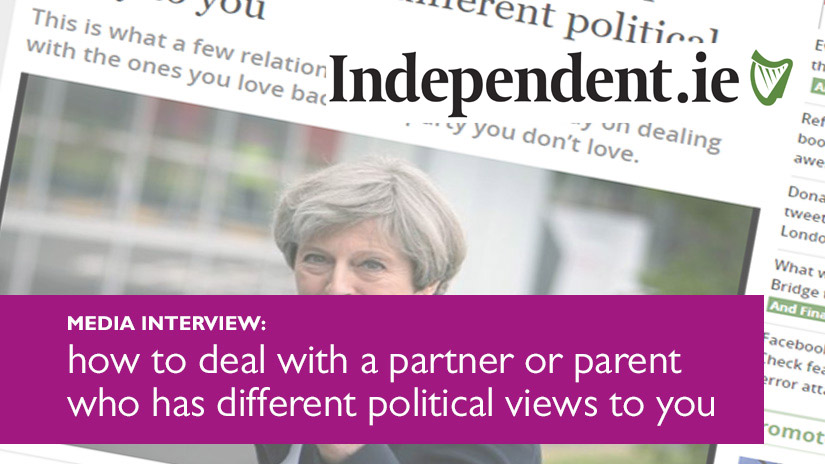how to deal with a partner or parent who has different political views to you

Some couples avoid these types of tricky situations because they believe it’s better to sidestep any differences that may lead to dispute, conflict or a falling out, when actually the opposite is true… ”
Extracts from this interview with David James Lees were published in the National Student and Irish Independent at the beginning of June 2017.
full interview
politics and your prospective partner
Should you discuss politics with a prospective partner before you get together?
Absolutely, you should take all opportunities to discuss everything with your prospective partner. The root of any relationship is to ‘relate’. This means there should not be any subject ‘off limits’ and learning how to compassionately relate will only build a stronger, longer lasting relationship, no matter what your politics.
Some couples avoid these types of tricky situations because they believe it’s better to sidestep any differences that may lead to dispute, conflict or a falling out, when actually the opposite is true.
I recommend learning how to cooperate over challenging issues, not compromising for a quiet life, even on the most contentious of subjects. Mastering this challenging life skill will not only be beneficial for you but also for your partner and your relationship.
What if someone has only just realised their partner’s views now they’re in a relationship?
First, I would question why it’s taken you so long to realise your partner’s political and world views and opinions. Have they deliberately kept quiet? Are they scared to tell you? Have you been disinterested in their views? Do politics even matter to you?
These types of inclusive questions form the basis of any successful long-term relationship. You don’t have to agree, but you must learn how to relate and cooperate whilst disagreeing and be able to discuss and accommodate your different opinions and attitudes in a loving, positive and meaningful way.
how to start a healthy political discussion
How should couples approach political discussion?
The 24-hour streaming of news and social media nowadays mean it’s much easier to begin a political discussion. Not too long ago, politics were mainly discussed ‘down the pub’ or at work, but now it’s hard to escape the key political issues of tax, health, employment, education, housing and of course Brexit!
Often one specific ‘hot’ political issue or topic for you or your partner can provide a lever to open up a healthy discussion of your broader social-political beliefs. You could wait for a political issue to create a reaction in your partner and then ask them ‘why?’. Be genuinely interested in their point of view. Develop the discussion by asking about the background information and history that supports their beliefs.
This simple, neutral enquiry and questioning process, which I call the ‘following the Golden Thread’, will allow your partner to openly state their views and opinions without you being judgmental or critical of them.
This inclusive approach will also give you the opportunity to state your views and opinions along with any supporting rationale. You can then widen the discussion from the specific political issue into exploring the history and background of you and your partner’s deeper beliefs.
What about those who are too scared to bring the topic up in order to avoid an argument?
In this case, a little self-development work is needed, not only on themselves but their relationship.
Remember, avoiding is only postponing, and an argument always requires two people. There is also a vast difference between confronting and being confrontational. Learn to confront with love.
I would ask them what is so upsetting about their partner having a different opinion? Perhaps their partner’s opinion is correct, and so they can take this opportunity to learn something new. Or perhaps their partner’s view is misguided, in which case the partner can learn and benefit too. I see this as a win-win situation, which will strengthen both the individuals and the relationship.
If they feel ‘scared’ or negative in any way about approaching their partner, I would encourage them to remember that they are the creator of their emotions, not the victim of them. So, this also presents a perfect opportunity for them to learn how to manage challenging issues in a loving, compassionate manner.
what you should & shouldn’t do when discussing politics
What should someone definitely NOT say or do in a discussion about politics with their partner?
Firstly, you should refrain from saying any dismissive or derogatory statements such as: “you don’t know what you’re talking about!”, “that’s a load of rubbish!”, or “that’s one of your crazy ideas!” These are judgemental, critical and unloving statements that create antagonism and rivalry, thereby restricting any meaningful or beneficial discussion and cooperation with your partner.
Secondly, you should NOT lose control of your emotions during any discussion. Remember: you control your mind, your mind does not control you. Becoming angry, resentful or frustrated only creates division, separation and an entrenched position from where it’s very difficult for you to hear your partner’s point of view.
Your partner will always have a rationale for their political beliefs, and even though you may disagree with them you should give them the respect of listening and trying to understand their perspective.
What if partners feel like they’re letting themselves or their party down by accepting the other person’s point of view?
I would encourage them to be intelligent, pragmatic and take full self-responsibility for their opinions and point of view. A political party is not a cult and their policies should be open for discussion, debate and evolution.
I would remind them that they would be letting down themselves and their party if they discovered a superior or better point of view and refused to examine, learn from or adopt it.
Political parties are like relationships, they only grow stronger when they are flexible, adaptable and willing to listen and grow. Those who shy away from embracing authentic change are not only letting down their party but also their relationship and themselves!
keeping emotions out of the discussion
What is the best way to prevent yourself from getting worked up or angry when discussing politics?
First, take the time to do your own self-enquiry work and ensure that your political views are in fact YOURS and not something that you have inherited from your family, your environment or peers.
Then take the time to listen, not only to the political points your partner makes but also to the background evidence that supports their stance.
Learning how to debate in a collaborative manner creates a healthy environment and relationship. All meaningful relationships are built on love, cooperation compassion and respect. This does not mean that you always must agree, but it does means that you can learn how to constructively disagree.
If you ever get worked up or angry whilst discussing politics or any other important issue in your relationship, it means that you have failed to maintain self-responsibility for your emotional wellbeing, which is far more important than failing in the debate or discussion.
can politics damage a relationship?
Is politics make-or-break in a relationship? Is it too drastic a measure to split up, can it be worked through and what advice would you have for someone considering this option?
I would suggest that no one issue should be strong enough to make or break a relationship. If it does, the problem is with the relationship and not the issue.
Relationships are an organic, fluid and flexible energy that must be maintained and nurtured. The way we do this is by relating.
There are three energies in any relationship: the energy of the two partners and the energy of the relationship. The relationship energy can only be maintained if both partners are willing to communicate. This does not mean that they must agree on every subject, but they should manage their different opinions and disagreements in a loving, nurturing and respectful way.
This approach will define the relationship and, if maintained, any differences can be worked through and the relationship will become stronger!
Do you think it’s possible for a left-leaning and a right-leaning partner to genuinely and happily maintain a healthy relationship?
Yes, if they’re both invested in maintaining that healthy loving relationship!
This means they are not interested in scoring political points, one-upmanship or brinksmanship, but enjoying the diversity and embracing the stimulating and thought-provoking energy it can create within the relationship.
discussing politics with your children
What about if the couple has kids – how is the best way to discuss politics fairly with their children?
Teach your children how to develop and hold their own point of view. Educate them in the art of debate and discussion.
It can be beneficial for parents to have contrasting political viewpoints, as this will encourage the children to understand and question a wider spectrum of possibilities about life and politics.
One of the greatest gifts we can give to our children is to teach them how to ask the question “why?”, and to listen, debate and discuss the answer.
Children have a great thirst for knowledge and educating them to thrive in an open environment, where their own opinions are encouraged and valued, is one of the greatest gifts we can give them.
discussing politics with your parents
How best to can you discuss politics with your parents without falling out?
Separate politics from personal. Many parents will presume that their children will follow their political views and if this is not the case, great care needs to be taken when having a political discussion.
To prevent arguments or a falling out, be mindful to limit your discussion to party policies and not historical personal issues. Also, don’t just try to repeat just the headline political point and hope to make headway. Widen the discussion to include the supporting rationale and potential benefits as you see them and allow them to do the same.
What’s the best way to deal with living under the same roof as your parents if you always argue about politics?
Refuse to argue! Change your perception about winning or losing and one-upmanship, instead, be more interested in the background thoughts and beliefs that create their ‘headline’ point of view.
So rather than saying: “you’re wrong” or “that doesn’t make sense!”, why not try saying: “that’s interesting, why do you think/believe that?”
This simple technique will change an argument into a genuinely interesting inquiry and conversation about your parents, their history, and background, which demonstrates that although you may have a different view you still respect and value them.
Should you try and change your parents’ views or can you learn to live with them?
You will never ‘change’ anyone’s point of view, the best you will ever achieve is to help broaden their personal perception, allowing them to review and reassess their own thoughts and beliefs.
There should be no problem with living with someone who has a different point of view, in fact, it would be impossible (not to mention very boring) to share the same viewpoint on every subject. So, seeking harmony and cooperation via mutual respect coupled with a measure of acceptance would be the best way forward.
want more support
Learn more about Alex’s feng shui and mindful design work and how she can help you.
You can also:
- join our free Wu Wei Wisdom Facebook Group where you’ll find lots more guidance and discussion
- sign up for our free weekly email newsletter with all our latest teachings and news.
If you have any questions or would like more information on our work please contact us – we’re always happy to help.
like this post?
Please share it! This helps to pass on the positive Qi of our work to others who may benefit…
